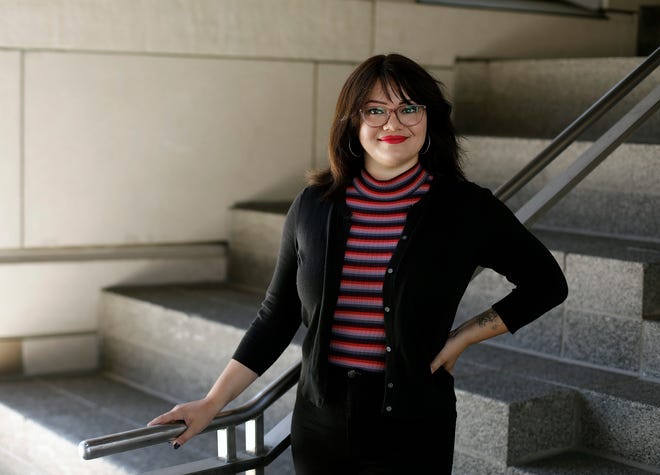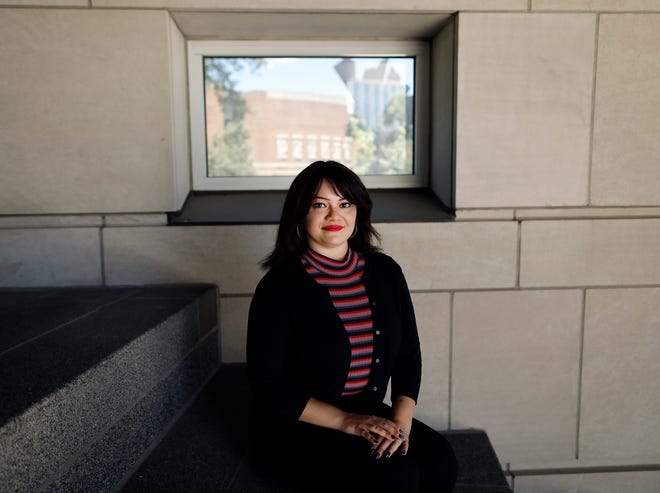New Ohio State law clinic to help immigrants in U.S. legal system

When Laura Barrera entered law school, she knew she wanted to make a career out of defending people against oppressive systems.
Now, years later, Barrera is helping law students learn how to do the same through a new immigration law clinic at Ohio State University.
Working as a team:New program trains non-lawyers to assist asylum seekers who have no legal counsel
The clinic, which starts in the fall, will be a combination of classroom time and real-world experience that will give up to eight students at the Moritz College of Law the opportunity to learn how to represent immigrants in legal proceedings, often those that could end in their removal from the country.
“It’s really special as a student to have that opportunity to learn to provide a real service to people and helping people while also having a space where someone is an expert and they can ask questions,” Barrera said. “We’re often helping people stay with their families and helping people stay safe.”
Peeling back layers of trauma: Community therapists helping Nepali refugees from Bhutan
The clinic not only will help students learn about immigration law by handling real cases, but it will provide a service to the community in the form of free legal services, said Barrera, a visiting assistant clinical professor of law at Ohio State and director of the new clinic.
In immigration court, immigrants are not provided an attorney by the government, so they have to find one of the few pro bono attorneys in Columbus or find a way to pay for one.
Part of the fabric of the community:City fund helped nearly 70 immigrants in deportation cases, hundreds more with education
Despite the fact that more immigrants live in Columbus than any other Ohio city, there are no other local organizations providing pro bono services for deportation defense locally, said Amy Bittner, a Columbus immigration attorney who takes pro bono or low-cost immigration cases as she is able.
Bittner, who began teaching immigration law at Ohio State in 2017, is excited about the clinic and its potential for a positive impact on the immigrant community locally, as well as students, who seem to be more and more interested in the topic.
“I’ve seen a trend since I started teaching in 2017, when the president at that time made immigration at the forefront of the media, and since then I’ve seen an increasing number of my students want to go into immigration law for their career,” Bittner said.
She said she has been asking the school about adding an immigration clinic to its seven existing clinics for years.
‘A senseless waste of taxpayer money’:Immigration court backlog has nearly doubled under Trump
Steven Huefner, a law professor and director of clinical programs at the Moritz College of Law, said student demand and the opportunity to provide immigration legal services in the community was a driver of beginning the clinic.
“It’s long been obvious to the leadership at the college of law here that there was both significant student interest in immigration law … (and) that there were plenty of opportunities to provide immigration law services in the community,” Huefner said.
He said the school began thinking a few years ago about beginning an immigration law clinic, but it had to find the resources to do so, namely funding for a staff position and overhead costs.
COVID-19:Ohio immigration advocates urge release of undocumented detainees, fearing rapid spread of coronavirus in jails
Recently, a local community organization that wants to remain anonymous offered the funding and a partnership. The funding is for one year, but Huefner said the school hopes to continue the immigration clinic beyond that and is looking for the resources to do so.
“I do hope that the launch of our immigration clinic can affirm to anybody who’s paying close attention to this that there is a vast unmet need for this type of legal support to immigrants,” Huefner said.
“The field of immigration law has been in quite a bit of flux over the last half decade, and many immigrants have found themselves really destabilized by that degree of flux, uncertain about their futures, and a clinic like ours is really only beginning to scratch the surface of that unmet need in helping immigrants to stabilize their status, make more permanent plans regarding them and their families, and make things right with the law and existing structures.”

It’s almost impossible to win an immigration case without an attorney, according to Advocates for Basic Legal Equality, Inc. (ABLE), an Ohio nonprofit that works with Columbus city officials to provide representation for undocumented immigrants from Franklin County.
A 2021 ABLE report shows that most immigrants have to defend themselves in immigration proceedings, but that 93% of people granted deportation relief in the past 20 years had an attorney.
“Hundreds of thousands have been denied a fair opportunity to exert their legal rights simply because they had no one to stand with them before a judge,” the report reads. “Legal advocacy is more critical than ever as the harms of the coronavirus pandemic fall disproportionately on people of color, immigrant communities, and people who are detained or incarcerated.”
‘Strengthening families’:Citizenship classes offer lawyers’ help to immigrants in central Ohio
Morgen Morrissette, a staff attorney at Community Refugee and Immigration Services (CRIS), a local refugee resettlement agency, has worked with the juvenile law clinic at Ohio State and was excited to hear about the new immigration clinic.
“We have a huge, huge community of folks who need these services in Columbus, and we do not have enough services,” Morrissette said.
The clinic can take a limited amount of cases, but Barrera said she is already working with community partners, not only on referrals but also in hopes of collaborating with them on cases and other work.
Barrera said she intends to focus the clinic’s work on deportation defense cases, but she hopes students can contribute to the community in other ways, too. This includes contributing to know-your-rights workshops for local people and helping other organizations with parts of cases.
“We very much hope that we can be just part of a broader reinvestment of resources in dealing with the immigration issues in our society today,” Huefner said.
@DanaeKing




